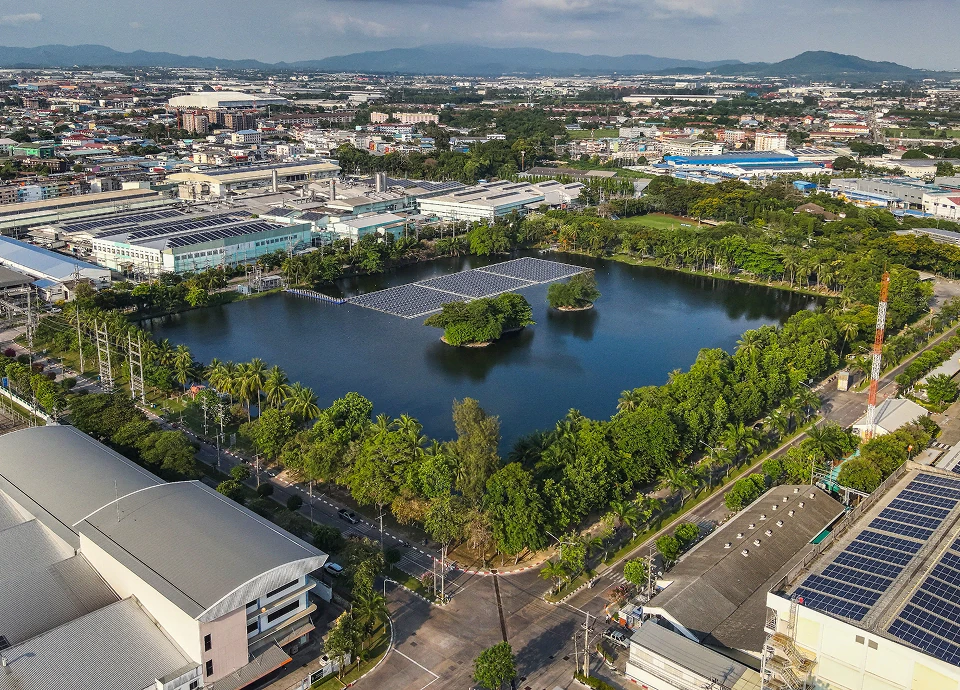Importance and Mission
The Company is committed to conducting its operations based on sustainable management principles, encompassing the entire resource utilization chain. This begins with assessing and analyzing both positive and negative environmental impacts to develop management plans that ensure optimal and efficient resource use. Importantly, the Company also monitors and measures the environmental impacts of its activities across various aspects. This ongoing review and improvement of current measures help control and reduce waste generated from different processes.
Goals and Performance
Annual Target for the Year 2024
- Number of Environmental Law Violations or Significant Fines: 0
- Number of Environmental Quality Indicators Not Meeting Legal Standards: 0

Performance
Number of Environmental Law Violations or Significant Fines: 0
Number of Environmental Quality Indicators Not Meeting Legal Standards: 0
Supporting the SDGs
Good Health and Well-being
Affordable and Clean Energy
Industry, Innovation and Infrastructure
Partnerships for the Goals
Management Approach
Fundamental Principles of Sustainable Environmental Management
Analyze Environment Impacts
Consider the potential environmental impacts of all activities and developments, and proactively seek solutions following the “Eco-Development” approach.
Develop Clear Resource Management Plans
Identify and specify the resources used within the organization, and establish guidelines for their optimal and sustainable use, focusing on longterm benefits
Utilize Resources According to Conservation Principles
Use resources judiciously, considering processes such as collection, preservation, conservation, repair, development, and disposal, including efficient waste recycling methods.
Monitor and Measure Impacts to Review Measures and Control Waste Generation
Employ effective tools and technologies in production processes to avoid pollution, and implement stringent control and monitoring measures, ensuring operations adhere to appropriate and scientifically sound methods.
In addition to an effective environmental management framework, the Company has announced an Environmental Policy along with an Environmental Management Manual. This serves as a guideline for the Company’s responsible environmental practices. An environmental working team has been appointed to drive the Company’s operations and activities efficiently. Their responsibilities include identifying and assessing environmental and energy issues arising from operational activities. Moreover, the Company regularly reviews and updates its legal and regulatory register, ensuring compliance with environmental laws, regulations, and standards. An Environmental Procedure (EP) on laws and other requirements, and compliance assessment (EP-CO-002), mandates biannual evaluations of legal and regulatory compliance. The goal is to ensure no violations of environmental laws and quality standards across all indicators. The compliance assessment results have consistently met legal and regulatory requirements, with no significant fines for violations
The Company has also achieved certifications for Quality Management System (ISO 9001:2015), Environmental Management System (ISO 14001:2015), and Energy Management System (ISO 50001:2018). These certifications provide a framework and standards for the Company’s environmental and energy management systems.
Framework and standards for the Company’s environmental and energy management systems.
| Operating Areas | ISO 9001:2015 | ISO 14001:2015 | ISO 50001:2018 |
|---|---|---|---|
| Saha Group Industrial Park Sriracha | |||
| Saha Group Industrial Park Kabinburi | |||
| Saha Group Industrial Park Lamphun |
The Company has been certified under the Environmental Management System Standard (ISO 14001) for 3 out of a total of 8 sites, representing 37.5% of the Company’s business operations.
Eco-Industrial Estate
The Company supports government policies by adopting the eco-industrial town development framework for environmental management. This framework encompasses management across five dimensions and 20 aspects, including physical, economic, environmental, social, and managerial dimensions. It serves as a guideline for efficient and beneficial management within Saha Group industrial Park.
Saha Group Industrial Park Development Policy for an Eco Industrial Town PolicyCompliance with Environmental Impact Mitigation Measures
The Saha Group Industrial Park in Lamphun and Kabinburi are required to prepare biannual reports on compliance with environmental impact mitigation measures and environmental quality monitoring, as specified in the Environmental Impact Assessment (EIA) Monitoring Report for both areas.
This requirement is in accordance with the Ministry of Natural Resources and Environment’s regulations, issued under Section 48 of the National Environmental Quality Promotion and Preservation Act (No. 2) B.E. 2561. The reports cover compliance with measures to prevent, mitigate, and monitor environmental and social impacts. The Company must submit these reports to the Office of Natural Resources and Environmental Policy and Planning (ONEP), the Office of Environmental and Pollution Control, the Provincial Office of Natural Resources and Environment (PONRE), and the Department of Industrial Works (DIW). The information is also disclosed on the Environmental Impact Assessment Information Center’s website here: https://eia.onep.go.th/
Stakeholders Directly Impacted
Employee/Executive
Received training on environmentally friendly operations.
Customers
Able to select environmentally friendly products.
Community and Society
Benefited from conservation and pollution reduction programs.
Government Sectors
Received information and support for implementing environmental policies.

